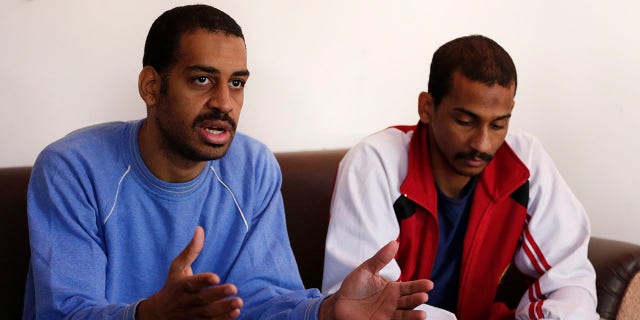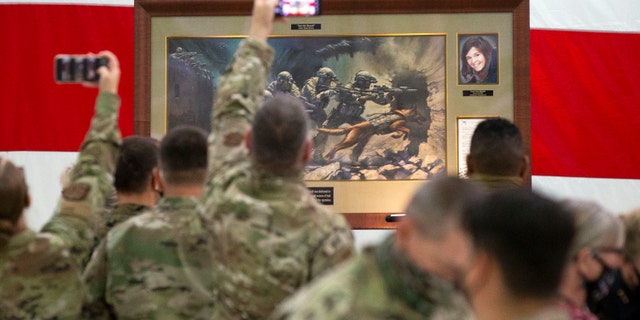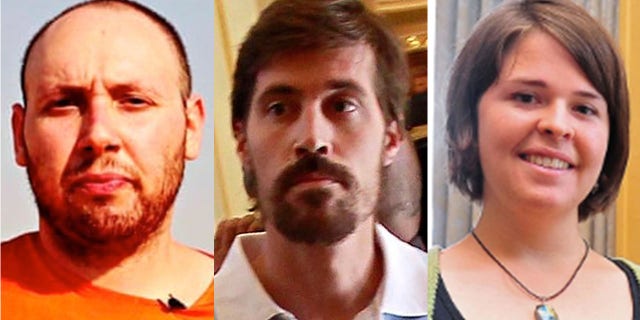It’s a haunting image: American journalist James Foley kneeling in the ancient, sandy plains of Syria. His face is a map of resilience and stoicism and he is outfitted in a tangerine jumpsuit while a black-clad ISIS member wields a knife beside his neck.
Weeks later, in the early spring 2014, a similarly chilling video emerged showed the execution of American writer Steven Sotloff, a “second message to the United States” from the brutal terrorist outfit.
But early this month, after years of exhaustive work by the U.S. intelligence community and government, two of the men involved in the grisly murders were transported to the U.S. to face justice.
Alexanda Kotey and El Shafee Elsheikh are one half of what is known as “The ISIS Beatles,” because of their striking English accents.
“This extradition is a win for justice and accountability,” Stephanie Foggett, director of global communications at the Soufan Group. The intelligence and security consultancy worked with the victims’ families pro bono on “The Beatles” file, Foggett told Fox News.
“The families of the American victims have been united and vocal about their wishes to bring these two men to America for trial,” she said.
The two appeared in a V.A. federal court Oct. 7, charged with eight felony counts in connection with the abduction and slaying of American journalists Foley and Sotloff, and aid workers Peter Kassig and Kayla Mueller. Both pleaded not guilty and requested a trial by jury.

In this March 30, 2019 photo, Alexanda Amon Kotey, left, and El Shafee Elsheikh, who were allegedly among four British jihadis who made up a brutal Islamic State cell dubbed “The Beatles,” speak during an interview with The Associated Press at a security center in Kobani, Syria. (AP Photo/Hussein Malla, File)
If convicted, the former Britons, who were stripped of their U.K. citizenship, face life behind bars, but not the death penalty. They are scheduled to appear before a judge in early 2021, when a trial date will be set.
ARIZONA GOVERNOR, NATIONAL SECURITY ADVISER UNVEIL PAINTING HONORING KAYLA MUELLER
The pair of ISIS operatives confessed to “interacting” with the hostages “sometimes violently,” but they denied killing them. The other half of “The Beatles,” leader Mohammed Emwazi, was slain in a 2015 U.S. drone strike, and Aine Davis was captured and tried by the Turkish government. He was sentenced to seven years in prison.
Kotey, 36, and Elsheikh, 32, however, were caught by the Syrian Democratic Forces, the leading U.S. military partner tasked with battling ISIS in its former stronghold of northeastern Syria. SDF fighters told Fox News that the men were trying to flee the uptick in fighting and feared for their lives as the “caliphate” capital of Raqqa crumbled. They tried to commingle with the swell of internally displaced people when an intelligence tip-off raised the alarm, the fighters said.
Elshikh, born in Sudan but mostly raised in the U.K., became known as “Jihadi George” throughout his reign of terror. Meanwhile, Kotey, who was born in Britain to a Greek Cypriot mother and Ghanaian father with childhood dreams of soccer stardom, reportedly became a London drug-dealer before finding Islam. But that path turned quickly toward radicalization.

Members of the Air National Guard view the painting honoring Kayla Mueller, a humanitarian and Prescott native, during a ceremony at the Goldwater Air National Guard Base, Oct. 8, in Phoenix. (Rob Schumacher/The Arizona Republic via AP)
According to the indictment, the men are accused of routinely harming the hostages physically and psychologically, having joined the fray of terrorism and violence as early as November 2012.
“The Beatles” also are accused of being part of the beheadings of British and Japanese nationals in the country and are connected to the slayings of at least 27 people. They are alleged to have supervised detention facilities where prisoners were tortured and transferred. They also are accused of coordinating ransom negotiations — via email — for Western captives and of marching helpless victims into desolation for their final, on-camera plea for their lives.
However, transferring the men from the SDF’s shaky hold in Syria through Iraq, into Britain and then finally to the United States, was a lengthy and detailed process, incomplete until last month.
Before that, there was chatter that the U.S. government wanted the pair shuffled off to the dwindling Guantanamo Bay facility, which was a position advocated by former Attorney General Jeff Sessions, until President Trump was made aware of the heavy price tag: $13 million per year, per detainee, at the controversial U.S. military base in Cuba.
But getting the accused to U.S. soil was mostly delayed in-part by the British government, which wanted assurances that two men would not be subject to capital punishment – as required by international law – to full confidence that the case against them was solid, often a difficult task for prosecutors probing far-flung places, insiders told Fox News.
The movement was further stalled by Elsheikh’s mother filing a lawsuit over the U.K.-U.S. cooperation. The extradition was blocked by the British Supreme Court in March. In August, Barr provided the written no-death penalty reassurance needed for the “over-the-pond” transfer.
In conjunction with their arrival comes a trove of intelligence and crucial information to support prosecutors in compiling their arguments.
Foggett noted that Britain’s slow relocation had to do with information sharing between the United Kingdom and the United States.
“Once U.S. Attorney General William Barr provided assurances to the U.K. that the U.S. would not seek the death penalty against the two suspects, the U.K. was able to share evidence with the U.S. on the two suspects,” she said.
The matter was further complicated by the complexities brought on by the global coronavirus pandemic, Foggett said.
Anne Speckhard, an adjunct associate professor of psychiatry at the Georgetown University School of Medicine, said ISIS “kept meticulous records of its crimes, including recording many of them, which is also evidence which can be brought into the courtrooms.”
“In this case, the two also confessed on video to journalists about some of their criminal activity,” she said. “That said, it is always difficult to obtain battlefield evidence, and there can still be legal challenges in the courtroom to evidence and witness statements introduced into court, and it remains to be seen if a successful prosecution will occur.”
It certainly could be far from a smooth sail for the U.S.
“Now that they (the two accused) are in the United States, they’ll have to either hire defense counsel or have lawyers appointed for them,” said Nitsana Darshan-Leitner, an Israel-based attorney who works on cases centered on seeking compensation for victims of terrorism and their families. “After this will be many legal challenges to the extradition process and arguments by the defendants that the American courts do not have jurisdiction over crimes that occurred outside the United States.”
Defense attorneys can be expected to challenge the extraterritorial jurisdiction that allows American courts to hear cases of overseas crimes because the victims happened to be American citizens, and the prosecution will have to show that ISIS targeted these people because they were Americans, Darshan-Leitner said.
All of these arguments and challenges, she said, will have to be heard long before there is any jury picked or any evidence presented.
“There could even be pre-trial appeals and extraordinary writs being brought,” Darshan-Leitner said. “You are looking at least two years of preliminary motions and rulings before the case is ready for jury selection. The defense will energetically argue that it is impossible to find an unbiased jury in the U.S. and that the court is prejudiced against them. All in all, the prosecution has an uphill battle and a very difficult evidentiary task ahead of them.”
POLITICAL POISON: WHAT’S GOING ON IN GUANTANAMO BAY?
Yet for families who lost loved ones, just getting this far is important.
“We are hopeful that the U.S. government will finally be able to send the important message that if you harm Americans, you will never escape justice,” a statement from the families of the four slain Americans reads. “And when you are caught, you will face the full power of American law.”

Steven Sotloff, James Foley, and Kayla Mueller
Indeed, the extradition is being hailed in Washington circles as an attestation to the shared mission of the U.S. government, intelligence and federal law enforcement, and public and private sectors.
“The United States government has a strong track record trying and convicting international terrorism cases in our civilian court system,” said Todd Rosenblum, a former senior homeland and defense official in the Obama administration. “Presumably, the British government has provided the U.S. government with legally sufficient, credible and specific evidence to meet the threshold for agreeing to extradite them to the United States, and for the United States attorney general to believe there is enough evidence to win convictions in American courts that hold-up against inevitable appeals.”
CLICK HERE TO GET THE FOX NEWS APP
Nonetheless, the due process of these individuals are merely two of many more – and there is much work to be done, Foggett said.
“We know that upwards of 40,000 foreign individuals from more than 110 countries traveled to Iraq and Syria to join the Islamic State,” she said. “Now that the terrorist organization has lost its territory and with many members in prisons, detention centers, and camps, the international community is faced with the challenges of what to do next. In this case, the United States has shown leadership in building a case against these two men and bringing them to the United States for trial. There is no place on earth better at bringing terrorists to justice than the United States.”